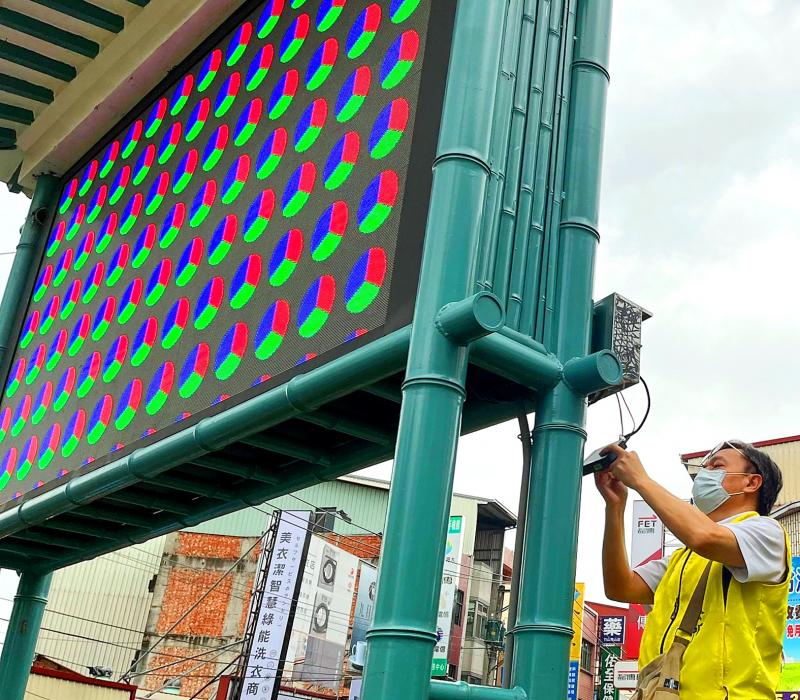Government agencies reported an unprecedented number of cyberattacks on Tuesday, when US House of Representatives Speaker Nancy Pelosi arrived in Taiwan, as Internet traffic volume reached 23 times the previous single-day record.
The Presidential Office, the Ministry of National Defense and the Ministry of Foreign Affairs continued to experience cyberattacks on Wednesday, Executive Yuan spokesman Lo Ping-cheng (羅秉成) told a news conference after the weekly Cabinet meeting.
No information security breaches were found after the government activated and reinforced preventive mechanisms, he said.

Photo: Hsieh Chieh-yu, Taipei Times
“Official Web sites of the Presidential Office and the Ministry of National Defense are under Level A cybersecurity responsibility. The Executive Yuan’s cybersecurity department has been asked to conduct round-the-clock inspections of government Web sites,” Lo said.
“The targets and means of the cyberattacks change daily, and the government is closely monitoring the situation,” he added.
Government agencies reported cyberattacks occurring in greater frequency in the past few days than previously, Lo said, adding that the purpose of the attacks was to penetrate government networks.
However, significant damage was prevented by protocols developed during regular information security drills, he said.
Taiwan Power Co yesterday said that it experienced 4.9 million cyberattacks on Wednesday alone, surpassing the total number of attacks recorded in June and last month.
The Web site of Taiwan Taoyuan International Airport, the nation’s largest international airport, was allegedly attacked by hackers yesterday after several users said that it took longer than usual to open the site.
“The Internet connection of the airport’s official site had been unstable since 8am, but it returned to normal at around 11am,” Taoyuan International Airport Corp said in a statement.
“The company’s internal network and our application continued to function normally,” it added.
Before Pelosi arrived, electronic bulletin boards in the Taiwan Railways Administration’s Sinzuoying Station and in some 7-Eleven convenience stores were hacked as well, showing messages in simplified Chinese characters asking Pelosi to leave Taiwan.
National Communications Commission Chairman Chen Yaw-shyang (陳耀祥) on Wednesday told a news conference at the Executive Yuan that the bulletin boards in the convenience stores were easiily hacked because they use Chinese software, which could contain Trojan malware and make them targets of cyberattacks.

The High Prosecutors’ Office yesterday withdrew an appeal against the acquittal of a former bank manager 22 years after his death, marking Taiwan’s first instance of prosecutors rendering posthumous justice to a wrongfully convicted defendant. Chu Ching-en (諸慶恩) — formerly a manager at the Taipei branch of BNP Paribas — was in 1999 accused by Weng Mao-chung (翁茂鍾), then-president of Chia Her Industrial Co, of forging a request for a fixed deposit of US$10 million by I-Hwa Industrial Co, a subsidiary of Chia Her, which was used as collateral. Chu was ruled not guilty in the first trial, but was found guilty

DEADLOCK: As the commission is unable to forum a quorum to review license renewal applications, the channel operators are not at fault and can air past their license date The National Communications Commission (NCC) yesterday said that the Public Television Service (PTS) and 36 other television and radio broadcasters could continue airing, despite the commission’s inability to meet a quorum to review their license renewal applications. The licenses of PTS and the other channels are set to expire between this month and June. The National Communications Commission Organization Act (國家通訊傳播委員會組織法) stipulates that the commission must meet the mandated quorum of four to hold a valid meeting. The seven-member commission currently has only three commissioners. “We have informed the channel operators of the progress we have made in reviewing their license renewal applications, and

‘DENIAL DEFENSE’: The US would increase its military presence with uncrewed ships, and submarines, while boosting defense in the Indo-Pacific, a Pete Hegseth memo said The US is reorienting its military strategy to focus primarily on deterring a potential Chinese invasion of Taiwan, a memo signed by US Secretary of Defense Pete Hegseth showed. The memo also called on Taiwan to increase its defense spending. The document, known as the “Interim National Defense Strategic Guidance,” was distributed this month and detailed the national defense plans of US President Donald Trump’s administration, an article in the Washington Post said on Saturday. It outlines how the US can prepare for a potential war with China and defend itself from threats in the “near abroad,” including Greenland and the Panama

A wild live dugong was found in Taiwan for the first time in 88 years, after it was accidentally caught by a fisher’s net on Tuesday in Yilan County’s Fenniaolin (粉鳥林). This is the first sighting of the species in Taiwan since 1937, having already been considered “extinct” in the country and considered as “vulnerable” by the International Union for Conservation of Nature. A fisher surnamed Chen (陳) went to Fenniaolin to collect the fish in his netting, but instead caught a 3m long, 500kg dugong. The fisher released the animal back into the wild, not realizing it was an endangered species at